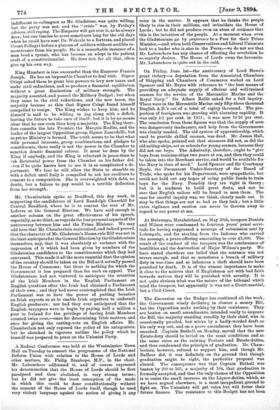King Humbert is less successful than the Emperor Francis Joseph.
He has an impossible Chamber to deal with. Signor Crispi asked them to grant him powers to levy new taxes and make civil reductions, and so produce a financial equilibrium without a great diminution of military strength. The majority assented, and passed the Military Budget; but when they came to the civil reductions, and the new taxes, the majority became so thin that Signor Crispi found himself compelled to resign. The King wishes to keep him, and he himself is said to be willing to jog along with a deficit, leaving the future to take care of itself ; but it is by no means clear that he can even thus keep a majority. The King there- fore consults the late Premier, the Marquis Rudini, and the leader of the largest Opposition group, Signor Zanardelli ; but as yet no Ministry is formed. The truth seems to be that what with personal interests, group combinations, and pledges to constituents, there really is not the power in the Chamber to sanction drastic financial reform. It must be done by the King if anybody, and the King is reluctant in peace-time to ask dictatorial power from the Chamber as his father did, tven if he quite knows how to use it in so complicated a de- partment. We fear he will allow the State to stumble on with a deficit until Italy is compelled to ask her creditors to consent to a composition. She is overweighted with debt, no doubt, but a failure to pay would be a terrible deduction from her strength.






































 Previous page
Previous page